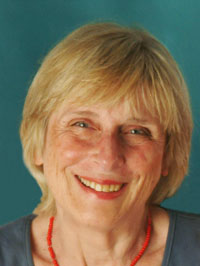Eva Etzioni-Halevy’s Aggrieved Women of the Bible
 Austrian-born Eva Etzioni-Halevy hid from the Germans as a small child and then emigrated with her family to Palestine after the war. She’s turned to fiction writing after a long career as a sociologist; for her first novel, The Song of Hannah, she draws inspiration from the Bible and the unusual family described in the First Book of Samuel. (If this was Heeb, I’d probably be calling this “Samuel Has Two Mommies,” but not because it has anything to do with that–where do you people get these ideas?) Hannah’s gone from the original story by the second chapter, and Etzioni-Halevy’s other female protagonist, Pninah, gets even less mention, so the novel does a lot of imaginative filling in the blanks. In this original essay for Beatrice, she explains why.
Austrian-born Eva Etzioni-Halevy hid from the Germans as a small child and then emigrated with her family to Palestine after the war. She’s turned to fiction writing after a long career as a sociologist; for her first novel, The Song of Hannah, she draws inspiration from the Bible and the unusual family described in the First Book of Samuel. (If this was Heeb, I’d probably be calling this “Samuel Has Two Mommies,” but not because it has anything to do with that–where do you people get these ideas?) Hannah’s gone from the original story by the second chapter, and Etzioni-Halevy’s other female protagonist, Pninah, gets even less mention, so the novel does a lot of imaginative filling in the blanks. In this original essay for Beatrice, she explains why.
How would a woman react if she was unable to bear children, and her husband consoled himself by marrying another woman and having children with her? How would a woman respond if she found that, although she had borne her husband sons and daughters, he did not love her, but loved another woman and married her? And how would the two women–the barren and the unloved one–feel if they shared the same husband?
These are the questions that inspired my writing of The Song of Hannah. For this is the stuff the story of Hannah and Pninah, on which the novel is based, is made of. I had heard that story each year as it was read on the High Holidays in the synagogue, and each time these questions popped up in my mind.
It occurred to me that the grief of the barren woman, Hannah, was temporary; it dissolved the moment her son, the prophet Samuel, was born. By contrast, the unloved one, Pninah, was permanently and deeply injured. So I had little doubt that she would find a way to get back at both her rival and her husband.
So I decided to champion Pninah’s cause by writing a novel in which I would depict her hurt, her enmity toward Hannah and the revenge she wrought on her husband in the arms of a lover. But the heroines and heroes of the novel-in-the-making rebelled. They took over the story, and what started out as a tale of rivalry and revenge, gradually turned into a tale of redemption through friendship and love. In its course, both Hannah and Pninah are revealed as women of courage who stand up for each other’s and for their own interests in a male-dominated society.
A while ago, while I was in the process of writing the novel, I participated in a discussion group on the Biblical Hannah and Pninah story. In the course of the discussion, Hannah emerged as the heroine, while Pninah, who as the Bible tells us, shamed Hannah for being barren, emerged as its villain. One of the participants, whose name was also Pninah, said that she felt rather bad about it, and she wished her parents had named her Hannah, instead.
I decided there and then that my novel would show that whatever Pninah did came out of the depth of her sorrow. And that if the Pninah in the discussion group, or any other woman named Pninah read my book in the future, she would never again be ashamed of her name.
Recently a friend asked me if I would have wanted to travel back in time some three thousand years so as actually to meet my heroines and heroes. The question startled me, and at first I was even upset at it. For during the lengthy time in which I had been writing and rewriting The Song of Hannah, I had felt that, bit by bit, I was getting closer and closer to my heroines and heroes, until they were really part of me, or I of them. So time travel was really unnecessary: I was there already.
But as I turned the question over in my mind, it dawned on me that there was one of my heroes whom I actually would have loved to meet in person: Hannah’s son, the prophet Samuel. In my novel I have saddled him with a longlasting emotional torment, stemming from a forbidden love. Although in my heart I am pretty sure that this is how it truly was, still I would give much if, through time travel, I could get the ultimate assurance that I had hit the nail on the head.
9 September 2005 | guest authors |

 Our Endless and Proper Work is my new book with Belt Publishing about starting (and sticking to) a productive writing practice.
Our Endless and Proper Work is my new book with Belt Publishing about starting (and sticking to) a productive writing practice. 
